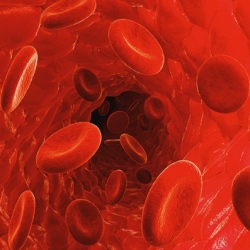
A device that can perform tests on a prick of blood was the promise of Theranos, a diagnostics startup that was found to have misled investors about its tech’s capabilities and whose founders were recently charged with fraud by the Securities and Exchange Commission. But Sight Diagnostics is not Theranos.
Sight is the brainchild of cofounders Yossi Pollak, previously at Mobileye (an autonomous systems startup that Intel acquired for $15.3 billion in 2017), and Daniel Levner, a former scientist at Harvard’s Wyss Institute for Biologically Inspired Engineering. They claim their first test to market, Parasight, which taps digital fluorescent microscopy and AI to detect malaria, is currently used in 25 countries.
The eight-year-old Tel Aviv medical company released something of a follow-up this summer in Olo, a desktop machine that analyzes blood from single-use cartridges. Sight says it can conduct “lab-grade” complete blood count (CBC) tests — tests that probe for a range of disorders including infection, anemia, and certain cancers — in 10 minutes from a finger prick or venous blood draw.
Typical CBC tests can take days.
“CBC is the most common test in the world,” Levner told VentureBeat in a phone interview. “The problem with it is that existing technologies don’t [provide a] full diagnostic result quickly.”
Olo, which is about the size of a toaster oven, leverages artificial intelligence (AI) to process scans. It first “digitizes” blood into colored microscope images, and then runs sophisticated computer vision algorithms (trained on half a petabyte of anonymized data from four years of clinical studies) that identify and count cell types in a sample.
Sight claims that Olo is easy enough for a layperson to operate, and that it’s robust enough to account for small inaccuracies and errors that might occur in slide preparation.
“The idea of digitizing blood has always been a difficult problem,” Levner said. “Creating a flat layer of millions of billions of cells on a glass slide has always been a difficult problem. We think that anyone should be able to run the test, so we tried to make it as simple as possible.”
Earlier this year, Olo completed a 287-person clinical trial at Israel’s Shaare Zedek Medical Center, leading to a CE Mark registration from the European Union. Pitted against a Sysmex XN-Series lab hematology analyzer, Olo “surpassed … targets” for equivalency across 19 CBC parameters and a number of diagnostic flags.
It’s since been deployed in several European health care systems and is undergoing clinical trials in the U.S. at Columbia University Irving Medical Center and Boston Children’s Hospital. Sight is aiming to recruit at least 500 participants for the stateside study, which is employing eight different Olo units.
“Previous blood analyzers aimed at in-office testing have involved clinical compromises and are difficult to operate or maintain,” Dr. Carlo Brugnara, the director of the Hematology Lab at the Boston Children’s Hospital, said earlier this year. “OLO has the potential to deliver on the promise of accurate, comprehensive blood testing at the doctor’s office, even with a finger prick sample.”
Sight Diagnostics has raised $25 million to date from former Google CEO and Alphabet executive chairman Eric Schmidt’s Innovation Endeavors. Pollak and Levner peg the CBC testing market at $30 billion worldwide.
The cofounders intend to obtain Federal Food and Drug Administration (FDA) approval in 2019 — initially a 510(k) approval, which would allow Olo to operate in CLIA certified clinics, and subsequently a CLIA waiver, which would bring it to small clinics and private practices. They also plan to publish the results of the most recent clinical trial in a peer-reviewed journal.
As far as the next few years are concerned, Sight is experimenting with the idea of a cloud service that could facilitate remote scans. But it’s not committing to a rollout just yet.
“It’s true that when you digitize the images, you can process patients at point of care, which could lead to improved follow-up testing,” Levner said. “We’re contemplating these kinds of models, but we’re trying to be regimented about what we do.”
